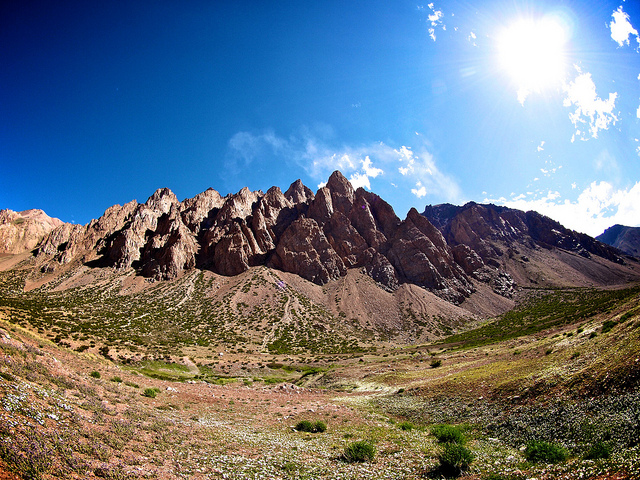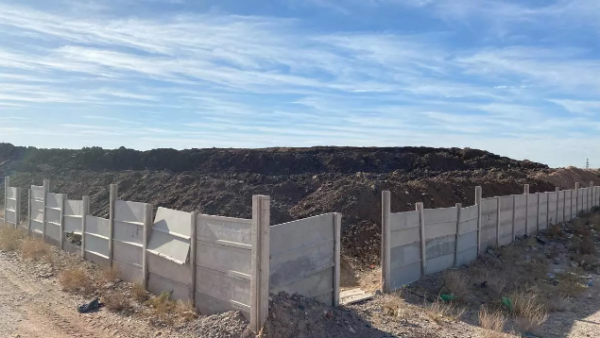Industry and environmentalists are gearing up for a fight over the country’s energy future
Argentina has an energy problem. The country imports more than $10 billion of gas and oil every year — a number that amounts to the country’s entire trade deficit. As a result, the value of the Argentine peso has fallen dramatically, contributing to the country’s 25 to 30 percent annual inflation rate.

One of the largest shale oil and shale gas reserves in the world sits beneath the Argentine Andes
Now, the government thinks it has found a solution. One of the largest shale oil and shale gas reserves in the world sits beneath the Argentine Andes, reserves that, thanks to recent technological advances, could be extracted through hydraulic fracturing, also known as “fracking.”
But Argentina has neither the resources nor the technology to tap its own shale reserves, so, in mid-July, the recently-renationalized Argentine oil company YPF signed an agreement with the US company Chevron to embark on a joint fracking venture in the Argentine Andes. Supporters of the agreement say it will bring investment and jobs and will reduce the country’s energy deficit. Opponents counter that increased fracking in the Andes would cause irreparable environmental damage and that developing the country’s renewable energy resources would be the true long-term solution to the energy crisis.
Argentina is gearing up for a national fight over fracking much like the battles that have occurred in the United States, South Africa, and much of Europe.
Only part of the Chevron-YPF agreement has been made public, and neither company responded toEarth Island Journal’s interview requests. But this much is known: Chevron has agreed to invest at least $1.24 billion in the project, and the two companies will drill 1,500 wells in a 5,000-acre area of a region known as Vaca Muerta (“Dead Cow”) located in the Neuquén Province of southern Argentina.
How much of that oil and gas, and how much of the profits, will stay in the country?
Only Chevron and YPF know for sure, but Mauro González, president of the Strategic Center for Argentine Growth and Development and general subsecretary of the Argentine Confederation of Midsized Companies, is optimistic.
“Given the policies of our national government … and the necessity to supply the local market with energy, I don’t think the state will be absent if Chevron says, ‘I’m taking everything,’” González says.
González sees the exploitation of shale gas and oil in Argentina as something to be “taken advantage of.”
“For the last ten years, Argentina has experienced sustained growth,” and, as a result, increased demand for energy and goods, he says. So the country “requires more investment in infrastructure, in energy production.”
Before June, there were only a couple of small fracking ventures in Argentina, says Diego Di Risio, of the Southern Petroleum Observatory, an NGO that tracks petroleum extraction in the country. Now, “YPF has signed agreements with Dow, the Neuquén-based oil company, [and] with Winter, the German company. And it’s negotiating with Exxon, Apache, Total, and others,” Di Risio says. As a result, “the argument about Chevron and YPF isn’t just about one agreement — it’s about creating a precedent for the entire sector.”
Opponents of the agreement have three major concerns: potential environmental harm, the failure to consult the Mapuche indigenous nation that lives on the land destined for fracking, and the Argentine government’s ability to oversee and control Chevron’s activities in the country.
Fracking has the potential to release methane gas into the air and dangerous chemicals into drinking water, opponents say. Mauro González, of the Center for Argentine Growth and Development, says the concerns are unfounded. “Only the newest technology will be used in Vaca Muerta,” he says, “which guarantees that it will be very environmentally-friendly.”
Regardless of whether that’s true, says Jonatan Baldiviezo, of the Argentine Association of Environmentalist Lawyers, the government has a constitutional mandate to release a full environmental impact statement for public debate before launching new industrial ventures on public land. So far, it has failed to do so.
“They don’t want to,” he says, because “they don’t want to make public the quantity of chemicals they use and what chemicals those are.”
Furthermore, opponents add, no one consulted the Mapuche of southern Argentina about the agreement. Under both the Argentine Constitution and international treaties Argentina has signed, the Mapuche not only have the right to consultation but also need to give their consent before any industrial activity that would modify their way of life takes place on their land.
Mapuche activists say they’re unlikely to grant consent. “It’s not just the land they are taking,” says Lautaro Nahuel, of the Mapuche Confederation of Neuquén. “All the natural life in this region is interconnected. Here, they’ll affect the Neuquén River, which is the river we drink out of.”
Finally, opponents are concerned about the government’s ability to oversee and control Chevron’s activities. Diego Di Risio, of the Petroleum Observatory, says that the government is creating new judicial bodies through which the oil companies will be able to influence government policy. So “it won’t be the state that determines if part of the profits have to be invested in social causes, what the best environmental practices are, and what taxes the company should pay,” he says, “but rather the state and the company together.”
***
Environmentalists point to renewable energy as a better way to address Argentina’s energy crisis.One recent study found that generating wind energy in Argentina would require about the same investment as fracking and would offer a faster rate of return. Contrary to proponents’ claims, fracking will involve investment by the taxpayers, Diego Di Risio says. For example, the government of the Neuquén Province has agreed to build new aqueducts to provide the water necessary for fracking. Di Risio adds that renewable energy production would create more jobs than oil extraction and that reduced energy usage and increased energy efficiency should accompany renewable energy exploitation.
Environmentalists plan to oppose fracking on many fronts. Some municipalities have begun to outlaw the practice, but the national government says those moratoriums are illegitimate, because the national government controls energy policy and natural resources belong to the provinces.
And the Chevron-YPF agreement might soon find itself in Argentina’s courts. Baldiviezo, the environmentalist lawyer, says prosecutors could fight the agreement on the basis of the lack of consent of the Mapuche nation and the failure to submit an environmental impact statement to public debate. “And then would come the deeper argument about whether or not fracking harms the environment,” he says.
If all else fails, says Diego Di Risio, activists can always put their bodies on the line to stop the company at the entrance to Vaca Muerta — a technique that both Argentine and Chilean activists have used to successfully halt strip mining in the Andes.
“We’re ready to defend the river, the earth, and the plants so that we can continue to live and develop ourselves as a people,” says Lautaro Nahuel, of the Mapuche.
Eilís O’Neill
Eilís O’Neill is a radio, print, and multimedia reporter based in Buenos Aires, Argentina. She covers primarily poverty and the environment.




